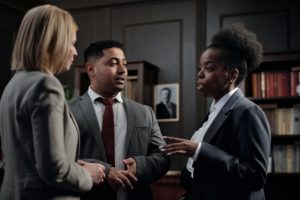It’s Political

pexels-august-de-richelieu-4427611
One of the questions I’ve been asked multiple time is how to handle politics. Not Politics as in what happens in the legislature, but politics as in what happens in the university. The question is often asked with a hint of dismay. Politics is a word that we often associate with being somewhat smarmy. And yet, we also admire people who understand how the system works and who can politic successfully. We don’t want to be told ‘no’ because someone else has more clout. Our ideas should be judged on merit alone. But we sure want our boss to be able to understand the politics and use the process well enough to be effective in garnering resources to our benefit. Seems a bit contradictory, doesn’t it?
My short answer to this question is that politics is simply relationships. Politics doesn’t have to be a dirty word, because like anything else we do, we can choose to be ethical in our relationships (politics) or not. I hear people say they don’t want to ‘play politics’. When they say that I think they mean they don’t want to have to say or be something they are not, and I support that. I believe we can have it both ways: we can be good at politics and still be true to who we are. Because politics starts with relationships.
We’ve all heard people complain about the silos in universities, but if I never leave my office and get to know anyone else on campus, then I’m the one building the silo. Recently, I led a workshop for group of about 25 colleagues. They were divided into two teams. Each team had the same task to complete. There was no prize for finishing first. In fact, the instructions are “You aren’t done until everyone is done. Success means everyone has been successful.”
One group finished first. The other team still had a ways to go. The completed group was celebrating and looked to me for confirmation. I simply repeated the instructions, “You aren’t done until everyone is done. Success means everyone has been successful.” They looked around their group trying to figure out who hadn’t completed the task. And they looked at me again. I repeated the instructions three or four times before they finally realized I meant the other team’s success was part of their success.
In the debrief at the end they brought up their own competitive dynamic and how long it had taken them to understand the message I was trying to convey. I pointed out that we complain about silos all the time, but here we had created two silos in a very short span of time, for no reason. It’s human nature to create groups and teams and to be most comfortable with the people on ‘our’ team. We have to go out of our way to work against this tendency. We have to create relationships across departments, divisions and across differences in perspective and opinion.
Politics as relationships means learning more about the university than my little part of it. It means getting to know people from other departments and working to understand the university from their perspectives. It means making sure I talk about the good work we’re doing in my department so people have a better chance of understanding why this project is so important to me. It means eating lunch with different people and sitting at tables with almost-strangers rather than the people you work with everyone day.
If you interact with people honestly then you build good relationships, and even if you are never going to be best buddies with someone, you can at least work effectively with them. You will be more effective at garnering resources because you are seen as someone who is good to work with, who can help get a project accomplished, who gives credit where it is due – and the list goes on.
Politics isn’t really a dirty word. Politics is people. Some of us are easy to work with and some are difficult. Some are honest and ethical and some, not so much. But the more we learn how to work together effectively and honestly, then the more politics becomes a positive concept, not one we want to shy away from.
Take care,
Gage
Adapted from UTSA SA Staff Newsletter May, 2009.
